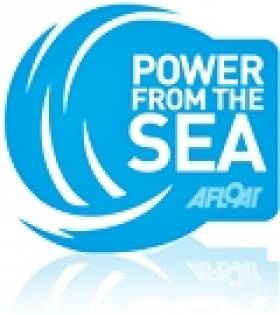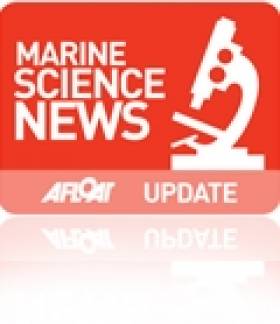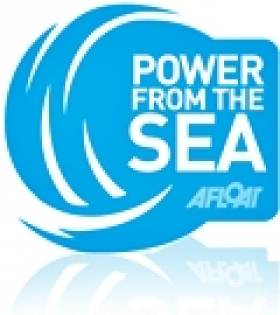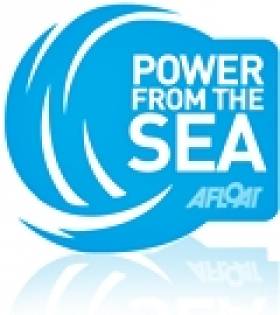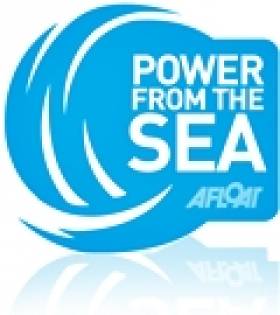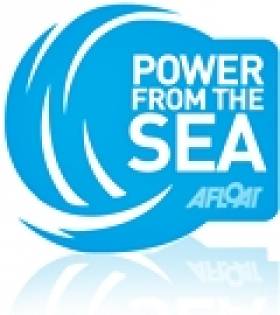Displaying items by tag: Ocean Energy
#MarineScience - A public information evening on the Galway Bay 'Ocean Observatory' is scheduled for this coming Tuesday 19 January.
Speakers from the Sustainable Energy Authority of Ireland (SEAI), the Marine Institute and SmartBay Ireland will be on hand to explain developments at the Galway Bay Marine and Renewable Energy Test Site.
The event from 7pm to 9.30pm at Tígh Giblin in Spiddal will also have a question and answer session.
Meanwhile, an information day on the second joint call for proposals for Marine Biotechnology ERA-NET will be held from 11am to 3pm on Friday 22 January at the Marine Institute.
Irish Labs Exploring Future Of Ocean Energy
#OceanEnergy - Not only the subject of a new Irish-authored research paper, Ireland's ocean energy potential is the focus of an in-depth feature this week on Silicon Republic that highlights five research labs in Ireland's renewables sector.
Among them are the Lir National Ocean Test Facility at UCC's Beaufort Centre, with its state-of-the-art wave simulators, and the Centre for Ocean Energy Research based at Maynooth University, which has an on-campus wave tank for testing its mathematical simulations of ocean energy devices.
And there's also the Litmus Technology Trialling Centre, part of the Nimbus Centre at the Cork Institute of Technology devoted to connected technologies, which has developed a 'smart kite' now being used by the Naval Service to boost ships' speed and generate power while at sea.
Silicon Republic has much more on the story HERE.
Apple Invests In Galway Bay Ocean Energy Research
#MarineScience - Apple's latest investment will mean more than a jobs boost as the technology giant has also committed to marine energy prototypes at Galway Bay's 'ocean observatory'.
Yesterday (Wednesday 11 November) Apple announced an expansion of its Cork campus to increase its staff by 1,000 by mid 2017, according to RTÉ News.
But hidden in the headlines was news that the company has signed a memorandum of understanding with the Sustainable Energy Authority of Ireland (SEAI) to assist its grant recipients on marine research and development.
As renewable energy site reNews reports, Apple is providing a total of €1 million – €250,000 a year over four years starting in 2016 – to help ocean energy start-ups put their devices through their paces at the Galway Bay Ocean Energy Test Site.
Apple's vice president of environment, policy and social initiatives Lisa Jackson said the company is "excited by the potential of ocean energy to someday serve as a source of clean power for the data centre we are building in Athenry."
reNEWS has more on the story HERE.
More Millions For Ocean Energy Research In Budget 2016
#Budget2016 - Ocean energy research will receive a further €4.5 million boost in next year's Budget, as announced by the Department of Communications, Energy and Natural Resources.
The funding follows from last year's €10 million allocation to ocean energy research, after the publication of the Offshore Renewable Energy Development Plan in early 2014.
A total of €68 million has been allocated for energy efficiency and renewable energy in 2016 as revealed in Tuesday's Budget.
And a further €9 million is being provided for geoscience initiatives including the INFOMAR and TELLUS programmes, which will support expanded geoscience research in Ireland’s offshore and onshore.
INFOMAR researchers recently helped reveal the remains of World War I shipwrecks, some of which have not been seen since the boats went down a century ago.
Irish Projects Prove Ocean Energy Potential - MEP Kelly Tells Brussels Ocean Energy Forum
#powerfromthesea – Two Irish projects, based in Cork and Clare, demonstrate the potential that can be unleashed from Ocean Energy, according to Seán Kelly MEP who addressed the Commissioner for Environment, Maritime Affairs and Fisheries, Karmenu Vella, and other attendees at the Ocean Energy Forum held in Brussels this week. Sustainable Energy Authority of Ireland (SEAI) and Marine Renewable Energy Ireland (MaREI) were represented at the high-level meeting, at which Mr Kelly was the guest speaker.
The Ireland South MEP was keen to point out that technological advancement will be crucial in the coming years:"Emphasis on developing renewable technologies, such as ocean energy, is vital if we want to reduce greenhouse gas emissions, increase our share of renewables and reduce our dependency on imported fossil fuels," he explained.
"The ocean energy sector is now facing the challenges of proving the survivability of installations in all conditions, and their reliability in terms of efficiency, increasing the total time they can produce energy during the year, and reducing unplanned maintenance.
"Achieving cost reductions will be needed to send the right signals to policy makers and investors, and this will come through further innovation, experience and economies of scale."
MEP Kelly told the audience that demonstrative projects are required to highlight the potential of ocean energy. Ireland is very much at the forefront in this regard as projects begin to take the considerable step from prototype development to full-scale demonstration. Mr Kelly cited Irish activities in this sector as an example, giving particular mention to the new Marine Renewable Energy Ireland (MaREI) research centre in Ringaskiddy, Co Cork, and the WestWave project in Killard, near Doonbeg in Co Clare.
"The WestWave project is a significant one for the sector as it will look to demonstrate the durability and reliability of wave energy technology, generating an initial 5MW of clean renewable electricity from our plentiful resources on the west coast. Success for WestWave will pave the way for future commercial projects.
"Additionally, the new MaREI centre, set to open in July, is a hugely encouraging development and will allow our researchers to lead the way in maintaining Europe's global technology leadership in ocean energy", he added.
The Ocean Energy Forum was established in April 2014 to bring stakeholders together to work on the various issues that currently hinder further progress in the ocean energy sector. Ireland is considered to have one of the best offshore renewable energy resources in the world with significant potential to utilise these resources to generate carbon free renewable electricity.
'Ocean Observatory' For Galway Bay
#MarineScience - A subsea cable laid from the RV Celtic Explorer in Galway Bay this week marks a major milestone in the development of Ireland's national marine research and development infrastructure.
The four-kilometre cable and a frame to which sensors and monitoring equipment will be attached are part of the development of an ocean observatory in Galway Bay connecting the Galway Bay Ocean Energy Test Site to the shore at Spiddal, Co Galway.
The cable will supply power to the site and allow unlimited data transfer from the site for researchers testing innovative marine technology including renewable ocean energy devices.
The Marine Institute and the Sustainable Energy Authority of Ireland (SEAI) have been working together to promote and develop Ireland's ocean energy potential, and this project – with partners SmartBay Ltd, UCC (MarEI - Marine Renewable Energy Ireland), and Dublin City University – is part of a programme to enhance the Galway Bay Ocean Energy Test Site.
A suite of sensors and environmental monitoring equipment will be installed on the cable end frame this summer, as well a floating 'sea station' which will give developers real-time data on how their devices are performing in the ocean.
"Ireland's sea area is around 10 times the size of our land area and with one of the best offshore renewable energy resources in the world, the opportunities to harness the power of the ocean are immense," says Marine Minister Simon Coveney.
"The new facilities at the Galway Bay Ocean Energy Test site will attract companies and researchers developing marine technology and renewable ocean energy equipment, and will position Ireland at the forefront of these emerging sectors by developing an expert indigenous supply chain that will expand as these sectors grow.
"The ocean observatory will also enhance our ability to monitor the ocean and better understand how it works, which is critical to tackling issues such as climate change."
Energy Minister Alex White adds that "offshore renewable energy has the potential to be a major component of Ireland's future energy mix and it is vital that we facilitate developments like this one in Galway Bay.
"Over time, the introduction of ocean energy into Ireland's renewables portfolio will enhance the security of Ireland's energy supply, deliver green growth, and add to the 47,000 jobs already supported by our energy sector.
"Government support for ocean research, development and demonstration has been increasing with €16.8 million added to my department's multi-annual ocean energy development budget between 2013 and 2016, bringing the total cumulative funding to over €26 million."
Instrument nodes and sensor packages to be installed at the Galway Bay Ocean Energy Test Site this summer will contribute to marine sectors including environmental monitoring, shipping, maritime security and education.
Extensive historical wave and weather data is also available for this site since 2008 and is available to potential device developers.
The new research infrastructure is expected to position Galway Bay as a unique world-class ocean energy test site.
The addition of a cabled ocean observatory means Ireland will also play an important role in the Atlantic Ocean Research Alliance between Europe, the USA and Canada under the Galway Statement signed at the Marine Institute Galway in May 2013 – and under which the RV Celtic Explorer will undertake the first transatlantic mapping survey between Galway and Newfoundland this coming June.
The cable project is funded in part by Science Foundation Ireland (SFI) under its Research Infrastructure Call 2012 which contributed €2.2m to the project. The Department of Agriculture, Food and the Marine contributed an additional €600,000 to the project in 2014. The Department of Communications, Energy and Natural Resources will fund additional infrastructure and the ongoing operations of the Galway Bay test site through the SEAI Ocean Energy Programme.
More information on the project will be available at www.marine.ie and www.oceanenergyireland.com.
Budget Allocates €10 million To Ocean Energy Research
#budget – In today's budget €10 million has been allocated next year to ocean energy research, development and demonstration, following the publication of the Offshore Renewable Energy Development Plan earlier this year.
This funding will facilitate the development of the Atlantic Marine Energy Test Site off Annagh Point in County Mayo; ongoing activity at the Galway and Mayo Test Sites; and the co-funding of the in Ringaskiddy, County Cork.
The funding will also allow for the continued operation by the Sustainable Energy Authority of Ireland of the Prototype Development Fund, the main focus of which is on stimulating industry-led projects for the development and deployment of ocean energy devices and systems.
#OceanEnergy - A University College Cork project to investigate "nonlinear wave-current interactions in the nearshore" for the development of Ireland's ocean energy industry has been awarded a research grant worth more than half a million euro by Science Foundation Ireland (SFI).
David Henry's marine science research, approved under the 2013 Career Development Awards, is one of 40 projects receiving funding under SFI's double-headed grant scheme that totals some €23 million via the Department of Jobs, Enterprise and Innovation.
"Funding for researchers at the outset of their careers is an important element of the Government’s strategy for job creation in research and innovation under our Action Plan for Jobs," said Innovation Minister Sean Sherlock at the announcement on Tuesday 8 July.
"SFI’s funding schemes for early career researchers help ensure that excellent research with the potential for real economic and societal impact is properly supported in Ireland. Investment like this is important for Ireland’s developing international reputation for excellent research with impact."
SFI has more on the story HERE.
Haughey's Son Seeking Investors for Ocean Energy Project
#POWER FROM THE SEA - Conor Haughey is seeking €3 million investment in new wave power technology inspired by his father's attempts at making his private island self-sufficient, as the Sunday Independent reports.
Haughey, son of former Taoiseach Charles Haughey, says his company Blue Power has developed a new way of capturing energy from ocean waves - and that tests at UCC's Hydraulic Marine Research Centre have concluded the technology is superior to many existing products in the sector.
He said: "We thought, how can we harness the power of the ocean on our doorstep? We have the best waves in the whole world. The west coast of Ireland is a huge untapped resource."
The company is now looking for angel investors or a utility parter to develop the technology for commercial use.
Engineer Colin O'Brien, who will be desiging Blue Power's prototypes, commented: "The whole west coast of Ireland has incredible waves. We could be the Saudi Arabia of renewable energy."
The Sunday Independent has more on the story HERE.
Offshore Wind Energy is the Future – Dublin Ocean Conference Hears
#oceanenergy – Both Minister for Communications, Energy and Natural Resources Pat Rabbitte TD and the Chairman of one of the world's leading developers of offshore wind energy, Eddie O'Connor of Mainstream Renewables has spoken of Ireland's unique position as a leader of offshore power at today's opening of the International Conference on Ocean Energy in the National Convention Centre in Dublin.
The Minister said that Ireland has a renewable potential that is many times the size of our relatively small island electricity system.
Ireland has set out a National Renewable Energy Action Plan and intends to achieve its target through 40% renewable electricity, 10% renewable transport and 12% renewable heat to give 16% of Ireland's overall energy consumption in 2020 from renewable sources, in line with our target under the EU Renewable Directive.
Eddie O'Connor, CEO of Mainstream Renewable Power and a Founding Member of the “Friends of the Supergrid”, estimated that between 1m and 1.6m megawatts of offshore wind will have to be installed over the next forty years in order to meet future energy needs.
At an average cost of €3m per MW the total investment will be between €3 trillion and €4.8 trillion O'Connor told the Dublin conference. The gigantic investment will be the biggest ever spend in the EU and will be the largest European construction project in history. His full speech is here.


























